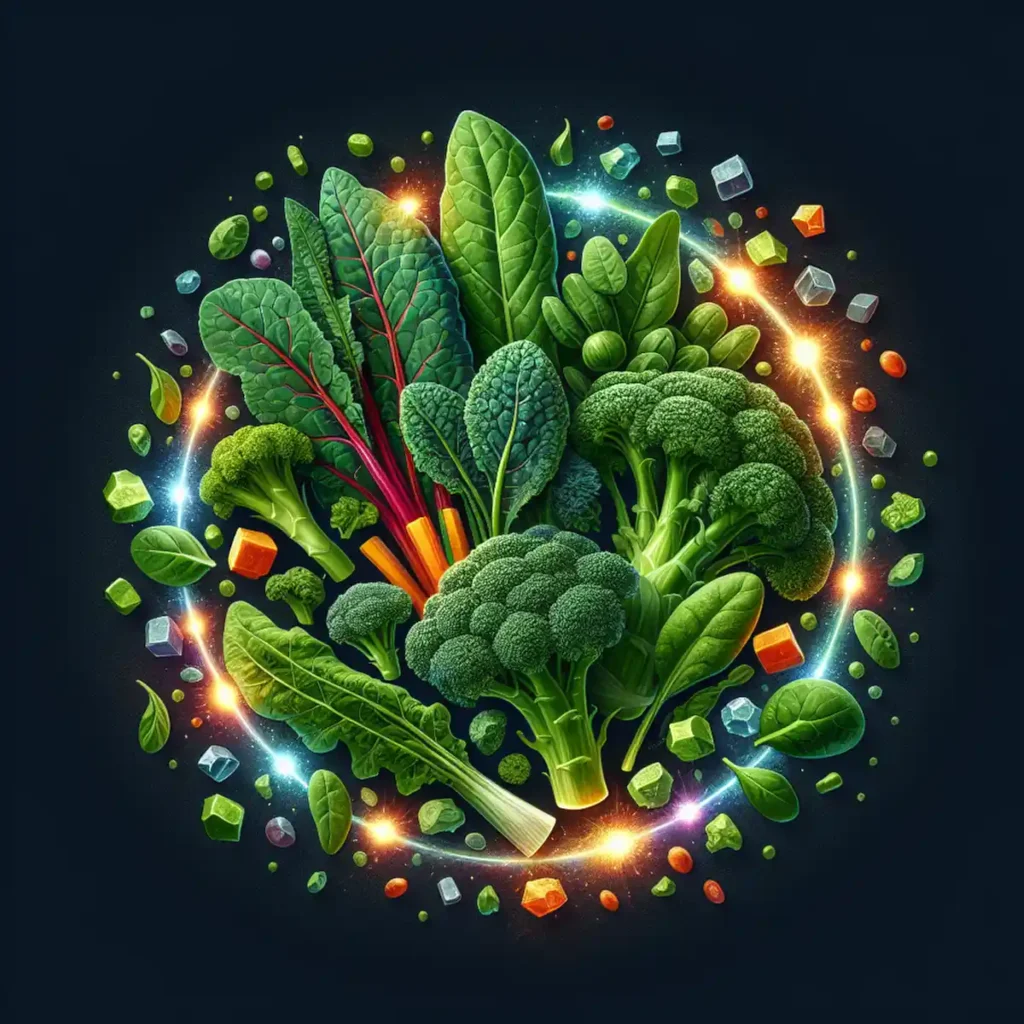As the old adage goes, “You are what you eat,” but when sickness strikes, this phrase takes on a deeper meaning. Navigating the landscape of nutrition during illness can be daunting, as the body’s typical dietary needs shift to support recovery. The right foods can be your allies in the battle against viruses, infections, and digestive disturbances. This article will serve as a culinary compass to guide you through the often-overlooked realm of therapeutic eating, focusing on the best foods to consume when sick. From the simplicity of the BRAT diet to the immune-boosting properties of leafy greens, we’ll delve into how specific foods can pave the way to health. Whether it’s an upset stomach or the common cold, the kitchen might just hold the key to your recuperation. Join us as we explore the healing potential that lies in our meals and how to eat your way to recovery.
Foods for Upset Stomach
When battling an upset stomach, reaching for the right foods can make all the difference. A stomach bug often leaves us with symptoms like nausea, diarrhea, and discomfort, urging us to be selective with our diet. The goal is to choose foods that are mild and easy to digest, helping to alleviate symptoms rather than exacerbate them.
What to Eat When You Have an Upset Stomach
Navigating food choices with an upset stomach can be tricky. The priority is to stick to bland and simple foods that are gentle on the digestive system. Start with options like saltine crackers, plain rice, clear broths, and skinless baked chicken. Over time, you can introduce more substantial choices like roasted vegetables and banana. To combat nausea, try sipping on clear fluids like ginger ale or ginger tea, which can help to settle your stomach. Maintaining hydration is crucial, so remember to drink plenty of water or suck on ice chips if plain water is unappealing.
The BRAT Diet: Bananas, Rice, Applesauce, and Toast
The BRAT diet—consisting of bananas, rice, applesauce, and toast—is often recommended for its simplicity and tolerability during stomach upsets. These foods are low in fiber, which can help to halt diarrhea and give your digestive system a much-needed break. While it’s effective for short-term relief, it’s not nutritionally comprehensive and should be augmented with other foods to create a balanced diet.
Ginger: A Natural Remedy for Upset Stomach
Ginger is a versatile and effective natural remedy for an upset stomach. Its anti-inflammatory properties soothe the digestive system, and its efficacy in reducing nausea is well documented. You can consume ginger in several forms—fresh ginger root in cooking, steeped as tea, or even as chewable candies. A simple recipe for ginger tea involves steeping sliced fresh ginger in hot water and adding a touch of honey for sweetness if needed.
The Benefits of Garlic for Stomach Health
With its array of health benefits, including antibacterial and antiviral properties, garlic is a formidable ally for stomach health. It’s thought to enhance immune response and may even help prevent common ailments like the cold and flu. Incorporating garlic into meals or taking aged garlic supplements could help boost your body’s natural defenses.

The Healing Power of Chicken Soup
The healing power of chicken soup extends beyond folklore. Rich in nutrients and hydration, chicken soup is soothing for the throat and comforting for the soul. Homemade recipes are especially beneficial as they tend to contain fewer additives and preservatives than store-bought versions. For an additional health boost, preparing chicken soup with bone broth can provide extra collagen and minerals.
The Importance of Proper Nutrition for Recovery
Proper nutrition is a cornerstone of recovery from any sickness. Foods rich in vitamins, minerals, and antioxidants support the immune system and promote tissue repair. Fresh fruits, leafy greens, and lean proteins are essential for providing your body with the nutrients it needs to heal. Additionally, staying hydrated and getting adequate rest are integral to your recovery journey.
Bland Foods for Soothing an Upset Stomach
When your stomach is unsettled, bland foods are your best friend. They include options such as oatmeal, boiled potatoes, and plain toast—with minimal seasonings or additives. These foods are easy on the stomach and less likely to cause further irritation or discomfort. It’s advisable to avoid high-fat, spicy, and acidic foods that could aggravate symptoms.
The Role of Dairy in Digestive Health
Dairy’s role in digestive health can vary from person to person. While foods like yogurt with active cultures can provide beneficial probiotics, dairy can sometimes exacerbate symptoms like diarrhea or mucus production in those who are sensitive. Listen to your body and, if dairy seems to be a problem, consider probiotic supplements or probiotic-rich non-dairy alternatives like kombucha or sauerkraut.
Following these dietary guidelines can help manage symptoms during illness and put you on the road to recovery. However, should your symptoms persist or worsen, it’s important to consult with a healthcare professional.
Boosting Immune Health with Nutritious Foods
When you’re feeling under the weather, the food you eat can serve as both comfort and medicine. Certain foods help bolster your immune system and can play a critical role in how you combat infections. Nourishing your body with the right ingredients can provide the necessary support your immune system needs to fight off illness.
Focusing on immune-boosting foods that are rich in vitamins, antioxidants, and other essential nutrients can give your body an extra line of defense against pathogens. Foods such as citrus fruits and leafy greens are packed with vitamin C, while probiotics found in foods like Greek yogurt support your gut health—a significant factor in immunity. Ingredients such as garlic add not just flavor, but also powerful anti-inflammatory and antimicrobial properties to your diet. And let’s not forget the comfort and nutrients that a classic bowl of chicken soup provides—a soothing blend that supports hydration, nutrition, and immune health all at once.
By integrating these healthful foods into your diet, particularly when you’re not feeling your best, you’re not only alleviating symptoms but also aiding in a quicker recovery. As we explore these food groups further, remember that incorporating a variety of these options will give you the broadest range of benefits.
Essential Nutrients for a Strong Immune System
To keep your immune system functioning at its peak, certain nutrients play a pivotal role:
- Vitamin C: Beyond reducing cold severity, this essential nutrient stimulates the production of immune cells and can be found abundantly in citrus fruits and leafy greens.
- Zinc: This mineral supports the immune function and is essential for cellular metabolism. Meat, legumes, nuts, and seeds are good sources.
- Selenium: A key nutrient for immune health, available in foods such as Brazil nuts, fish, and eggs.
- Omega-3 Fatty Acids: Found in fish and flaxseeds, these fats are significant anti-inflammatory agents that help the body’s defense mechanisms.
- Probiotics: These beneficial bacteria are vital for gut health, which is closely linked to our immune system. Found in fermented foods and dairy products like yogurt.
Citrus Fruits: A Vitamin C Powerhouse
Citrus fruits are celebrated for their high vitamin C content. They’re not just refreshing, but their antioxidant properties help fight free radicals in the body—unstable molecules that can harm your cells. Oranges, lemons, and grapefruits are not only juicy sources of hydration but also support the immune system in creating formidable barriers against infections. Regular consumption of vitamin C-rich citrus fruits can lead to a reduction in cold duration and bolster defense against respiratory infections.

Leafy Greens for Enhanced Immune Response
The vibrant shades of kale, spinach, and broccoli aren’t just pleasing to the eye; they are a signal of the rich nutrient content within. These leafy greens are loaded with essential nutrients like vitamin C, E, and zinc, all of which contribute to an improved immune response. Furthermore, the antioxidants present in these vegetables help protect cells from oxidative stress, reducing inflammation and potentially diminishing cold symptoms.
Probiotic Foods for Gut Health and Immunity
A happy gut means a strong immune system, and probiotics are key to maintaining a healthy gut flora. Consuming foods like Greek yogurt and kefir introduces beneficial bacteria into the digestive tract, which aids digestion and boosts your body’s ability to fight off infections. Some studies indicate that these probiotic-rich foods may even reduce the incidence of colds and flu, and ensure a speedier recovery when ailments do strike.
The Benefits of Garlic for Immune Health
Garlic has stood the test of time as a home remedy for its wide array of health benefits. Not only does garlic add depth and flavor to meals, but it also contains compounds like allicin, which have been shown to enhance the immune system. Regularly including garlic in your dishes can contribute to overall wellness, potentially reducing the intensity and duration of cold and flu symptoms.
The Role of Chicken in Supporting the Immune System
A bowl of chicken soup serves as a time-honored remedy for the common cold. But it’s not just for comfort—the protein from the chicken bolsters immune health, while the soup provides much-needed hydration. The zinc found in chicken is particularly effective at supporting the body’s immune responses, while amino acids released during the cooking of chicken can help reduce inflammation, offering relief for symptoms of respiratory infections.
Natural Remedies for Cold Symptoms
When you’re battling the sniffles and sneezes of a common cold, natural remedies can be a gentle yet effective way to manage your symptoms. Foods rich in antioxidants, vitamins and minerals help support your immune system and can provide relief. For example, garlic contains compounds that are potent virus-fighting agents, making it an excellent natural remedy that can also combat infections. Similarly, ginger is not merely a flavorful spice; its anti-inflammatory, antimicrobial, and antioxidant properties make it a reliable ally against digestive problems, colds, and sore throats.
Hot spices, like those found in chili peppers, can help open up nasal passages, providing relief from the congestion often associated with colds. Moreover, incorporating ginger into your diet, whether through spicy meals or soothing ginger tea, can help prevent colds, reduce sore throat discomfort, and alleviate respiratory inflammation.
Garlic doesn’t just bring flavor to your meals—it delivers health benefits too. Its antioxidants can stimulate the immune response by activating white blood cells, which plays a crucial role in its status as a robust natural remedy for cold symptoms. By relying on the healing properties of these foods, you take a step toward recovery with every bite or sip.

Ginger Tea for Congestion Relief
For those experiencing the discomfort of congestion, ginger tea emerges as a highly effective natural remedy, thanks to its anti-inflammatory qualities. Sipping on ginger tea can provide much-needed relief from cold-related inflammation in the respiratory tract. Beyond alleviating congestion, ginger tea is also heralded for its capacity to soothe upset stomachs and reduce nausea. This can be particularly helpful for individuals struggling with a cold accompanied by stomach discomfort. The immune-boosting powers of ginger are attributed to its ability to increase interferon levels, which are critical in fighting viral infections. All these benefits make ginger tea a top choice for easing cold symptoms, including congestion.
The Power of Citrus Fruits to Fight Cold Symptoms
During a bout with the common cold, citrus fruits are among the most powerful allies in your pantry. Oranges, lemons, and grapefruits, bursting with vitamin C, help to stimulate the immune cells, fighting off infections and contributing to a quicker recovery. But the benefits of citrus go beyond their vitamin C content; the flavonoids present in the white pith of these fruits can aid in speeding up the recovery process. Drinking citrus juices, like orange juice, provides immune-boosting vitamin C, and also contains folate which helps maintain immunological barriers against colds. When cold symptoms strike, reaching for a piece of citrus can be just as delightful as it is healthful, offering antioxidants that fight damaging free radicals and support your body’s recovery process.
Chicken Soup: A Natural Remedy for Common Colds
Chicken soup stands through the ages as one of the most endearing and effective natural remedies for the common cold. This comforting dish is more than soul food; it provides the body with essential nutrients, vitamins, and minerals needed during the healing process. Chicken soup possesses a unique compound called cysteine, which helps to break apart mucus and boasts antiviral effects. The warmth and steam from a bowl of chicken soup are especially good for relieving congestion. When made from bone broth, chicken soup becomes even richer in collagen and other nutrients, which may enhance the body’s ability to recover during illness. Whether it’s classic chicken noodle soup or a homemade recipe, this comforting dish continues to be a remedy of choice for respiratory infections, providing hydration and natural electrolytes for those feeling under the weather.
The Health Benefits of Fresh Ginger for Cold Relief
Fresh ginger is a versatile and potent food with a long history as an anti-inflammatory agent, capable of reducing swelling and discomfort caused by a cold. For those struggling with cold-induced nausea, ginger presents itself as a formidable remedy, widely used for its anti-nausea effects. Fresh ginger not only helps to ward off colds and soothe sore throats but also targets inflammation in the respiratory tract. Its use spans various forms: from being grated into soups to being steeped in hot water with a squeeze of lemon and a drizzle of honey, creating a cozy and beneficial ginger tea. Incorporating ginger into your diet during cold and flu season can serve as a preemptive strike against illness, as well as providing relief when symptoms arise.
Easing Congestion with Garlic and Onion
Swollen sinuses and a stuffy nose can make any cold or flu a miserable experience. Fortunately, garlic is known to have compounds that target viruses and infections, making it an effective food for easing congestion. Introducing garlic into your diet, particularly in soups or spicy dishes, not only boosts flavor but also aids in clearing the airways. Additionally, its antibacterial, antiviral, and antifungal properties further contribute to its efficacy.
Similarly, onions share some of the same immune-boosting properties as garlic. Consuming onion can support the body’s natural defenses and provide relief from congestion. Whether you prefer them raw, sautéed, or in a savory broth, these pungent yet healing foods can offer a layer of protection against the discomfort of colds, as well as enhance the taste of your meals.
Worst Foods for Congestion and Cold Symptoms
When you’re under the weather with a cold or flu, the foods you eat can either be a source of comfort or can exacerbate your symptoms. Highly processed foods, like packaged snacks, frozen meals, or fast food options, often lack essential nutrients and may suppress the immune system, which is counterproductive when your body is already fighting off pathogens. They may also contain certain additives and preservatives that can intensify congestion and cold symptoms.
Sugary foods are a double whammy, appealing to the taste buds but potentially worsening nasal inflammation. This includes desserts, cookies, and sugary soft drinks that may provide a brief moment of pleasure but at the cost of increasing inflammation and possibly prolonging your recovery.
Additionally, certain beverages like alcohol and caffeinated drinks such as coffee should be minimized. They have dehydrating effects on the body, which can challenge your immune system further and lead to increased congestion. Ideally, staying hydrated with plenty of water or herbal teas is recommended during this time.
Contrary to popular belief, reaching for spicy foods when you’re sick, especially those found in Indian or Thai cuisine, might do more harm than good. While they can temporarily clear your sinuses due to a runny nose, they can also lead to further congestion as the body responds to the spicy components, making symptoms feel worse in the long run.
In summary, steer clear of high-sugar, highly processed, and overly spicy foods when you’re struggling with cold symptoms. Your immune system will thank you for nourishing it with more healthful choices.
Broth-Based Soups with High Sodium Content
Broth-based soups are a traditional go-to for anyone feeling under the weather. While they can be soothing and hydrating, especially for those dealing with diarrhea or vomiting, it’s important to pay attention to their sodium content. High sodium levels can be beneficial in retaining fluids to maintain electrolyte balance, but excessive amounts may be counterproductive for those monitoring their blood pressure or who are sensitive to salt.
Clear broths and chicken soups can be particularly helpful in alleviating nasal congestion, thanks to the steam they produce and their warm liquid soothing the throat. For those suffering from an earache as part of an upper respiratory infection, the sodium in the broths can assist in managing the symptoms by ensuring proper hydration and electrolyte levels.
Nevertheless, if you are opting for store-bought soups, look for low-sodium options to avoid consuming too much salt, and consider adding extra vegetables to increase the soup’s nutrient content.
Frozen Fruit and Its Impact on Stomach Bugs
Frozen fruit can be a refreshing and nutritious option for those suffering from a stomach bug. Fruits like strawberries and blueberries are not only packed with anti-inflammatory and antiviral properties but also contribute to reinforcing the body’s immune response. Having a stash of frozen fruits on hand can make it simple to incorporate these immune boosters into your diet.
These fruits are high in anthocyanins and flavonoids, which have been linked to reducing the duration of cold symptoms. Adding frozen fruit to soothing foods like oatmeal, yogurt, or blended into smoothies can be both comforting and beneficial for throat soreness.
Additionally, avocados, available all year round, can be a substantial food option when feeling sick. They are abundant in essential nutrients and can provide necessary calories along with healthy fats, fiber, vitamins, and minerals.
The Dangers of Greasy and Spicy Foods for Digestive Health
Unsettling an already upset stomach is readily achieved by consuming greasy and spicy foods. These items are notorious for being difficult to digest and may intensify the feeling of stomach discomfort, bloating, and nausea. Dairy products may also contribute to the thickening of phlegm and increasing mucus production, which is specifically troubling for individuals grappling with a runny nose or congested chest.
Caffeine and full-fat dairy products, along with fried or greasy foods, are known to exacerbate gastrointestinal troubles, which is particularly avoidable when experiencing nausea and diarrhea. Managing symptoms and expediting recovery can therefore be aided by abstaining from these food types.
Junk Food and its Negative Effects on the Immune System
Ingesting junk food during a time of illness can have detrimental effects on the immune system. Foods laden with added sugars, processed flours, unhealthy fats, and excessive animal proteins can overburden the liver, cause chronic inflammation, and ultimately impair immune function. Specifically, a diet high in these components and low in the spectrum of vitamins and minerals found in fruits and vegetables may lead to a weakened gut microbiome, contributing to a lesser immune response.
A nourishing diet that includes a variety of whole foods and an abundance of vitamins and minerals is vital for optimal immune function, tissue repair, and maintaining essential bodily processes. The Harvard Health T.H. Chan School of Public Health thus recommends such a balanced diet, paired with adequate sleep, regular exercise, and a handle on stress management, to effectively support and enhance immune health, especially during times of illness.
Food FAQs (Frequently Asked Questions)
What foods should I eat for a sensitive stomach?
Opt for bland and simple foods that are easy on the digestive system, such as saltine crackers, plain rice, clear broths, skinless baked chicken, and bananas. Ginger tea can also help with nausea.
Can the BRAT diet help with an upset stomach?A:
Yes, the BRAT diet, which includes bananas, rice, applesauce, and toast, is recommended for its simplicity and tolerability during stomach upsets, as these foods are low in fiber and easy to digest.
How can ginger help during illness?
Ginger is an effective natural remedy for upset stomachs, offering anti-inflammatory properties and aiding in nausea reduction. It can be consumed in various forms, including fresh in cooking, steeped as tea, or as chewable candies.
What are the benefits of garlic for stomach health?
Garlic has antibacterial and antiviral properties, enhancing immune response and possibly helping to prevent ailments like the cold and flu.
Why is chicken soup good for recovery?
Chicken soup is rich in nutrients and hydration, soothing for the throat, and comforting for the soul. It's especially beneficial when made from scratch with fewer additives.
What nutrients are essential for a strong immune system?
Vitamins C and E, zinc, selenium, omega-3 fatty acids, and probiotics are pivotal for immune function, supporting the body’s defense mechanisms and promoting tissue repair.
Are citrus fruits beneficial during a cold?
Yes, citrus fruits like oranges, lemons, and grapefruits are high in vitamin C and antioxidants, supporting the immune system and potentially reducing cold severity.
How do leafy greens improve immune response?
Leafy greens, such as kale, spinach, and broccoli, are loaded with vitamins C and E, zinc, and antioxidants, contributing to improved immune function and reduced inflammation.



